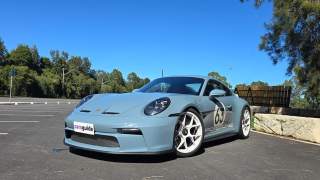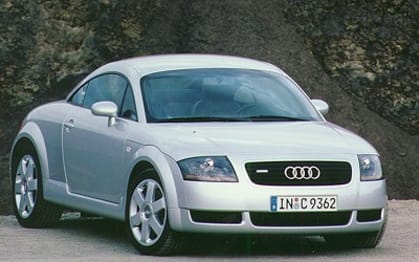
Used Audi TT review: 1999-2015
- Audi TT
- Audi TT 2013
- Audi TT 2006
- Audi TT 2007
- Audi TT 2008
- Audi TT 2009
- Audi TT 2010
- Audi TT 2014
- Audi TT 2015
- Audi TT 1999
- Audi TT 2000
- Audi TT 2001
- Audi TT 2002
- Audi TT 2003
- Audi TT 2004
- Audi TT 2005
- Audi TT 2011
- Audi TT 2012
- Audi TT Reviews
- Audi Reviews
- Audi Convertible Range
- Audi Coupe Range
- Convertible
- Coupe
- Audi
- Used Car Reviews
- Prestige & Luxury Cars
What we like
- Performance pretty good in even the smaller-engined models
- Seriously stylish sportscar
What we don't
- Spare parts prices aren't cheap
- Early generation double-clutch automated-manuals
What we like
- Performance pretty good in even the smaller-engined models
- Seriously stylish sportscar
What we don't
- Spare parts prices aren't cheap
- Early generation double-clutch automated-manuals
The recent introduction of the third generation Audi TT coupe and the imminent arrival of the open-top roadster has created quite a stir of publicity about the seriously stylish sportscar. To the extent that quite a few trade-ins are already appearing in the used-car yards. So here are some hints, tips and historical info to help you get yourself into a terrific TT.
We won't go into the all-new Audi TT MY15 here for obvious reasons, look out for it in our future used-car pieces.
Audi TT is great fun to drive but in the front-drive models feels more like a warm-to-hot hatch than a full-on sportscar. Which isn't a surprise - because underneath that gorgeous Audi skin there's a Volkswagen Golf GTI.
Introduced to Australia in May 1999, the Audi TT was a hit right from the start, chiefly because its radical shape. It was originally sold as only as a coupe, potential buyers were forced to wait another year for the roadster, it hit us downunder in May 2000.
The fascinating domed theme of the body carries through to the cabin. Big circular dials and and ventilation outlets really look the part.
There were several fatal high-speed Audi TT crashes in Europe, principally in Germany, caused by a design flaw in the earliest models. Aerodynamic weren't quite right and problems experienced by some drivers were exacerbated by the TT's very short wheelbase. Later models were modified in their suspension and have a rear wing to push the tail to the road at speed.
The latter spoils the purity of the visual effect to my way of thinking - though perhaps I shouldn't say that. There were suggestions that a lift-up wing in the manner of a Porsche 911 would have been a better fix, but Audi says this could have been too expensive.
The all-new gen-two Audi TT, which arrived in Australia in November 2006 sorted out the problem. It has a rear wing, that's hidden at lower speeds and raised at moderate speeds – that is at over 120 km/h, which is regarded as a moderate speed in more enlightened countries.
There are some that feel the TT lost its originality of shape in the gen-two model, describing it as generic rather than radical. The all-new TT has Audi's company's trademark single-frame grille. A sleeker bonnet line carries into the car's shoulders and tapers out towards the distinctive rear lights. The domed roof is still there, but doesn't jump out visually to the same extent as the original.
The original Audi TT was offered with 1.8-litre four-cylinder engines, in either light-pressure or high-pressure turbocharged format, the latter coming with the traction advantage of quattro all-wheel drive. The capacity of the four-cylinder unit was increased to 2.0 litres using a turbocharged with the second generation TT.
In December 2004, a 3.2-litre V6 was shoehorned under the bonnet of the Audi TT coupe, but not the roadster. Sensibly, the TT 3.2 also received the quattro system.
Straight-line performance is pretty good in even the smaller-engined models due to the TT's relatively light weight
A five-cylinder 2.5-litre RS engine with quattro was added to the range just in time for Christmas 2009.
Straight-line performance is pretty good in even the smaller-engined models due to the TT's relatively light weight, so don't automatically go for the higher powered units unless you are a full-on revhead. The smaller, lighter cars can be fun as they demand driver involvement to get the best from them.
A six-speed was used in TT quattros from their introduction in October 1999. Front-drive cars had a five-speed manual gearboxes until August 2005, when a six-speed manual upgraded it.
As Audi regarded the TT as being a pure sportscar no automatic transmission was offered until March 2003, when a six-speed torque-converter auto was offered with the low-pressure engines. Good as it was this transmission has been somewhat upstaged in the technology stakes by the six-speed double-clutch - tagged the S tronic - used in the Audi TT 3.2 quattro.
Like some other early generation double-clutch automated-manuals its characteristics at very low speeds can be variable and irritating at times. Test drive one in stop-start conditions to see what your think.
Audi TT is a high-tech car and should only be serviced and repaired by professionals. Good amateurs can tackle some of the routine maintenance work should they be so inclined. Make sure you've got a workshop manual close at hand, though.
Spare parts prices aren't cheap, but are in keeping with others in this class. It's much the same story with the cost of servicing and repairs.
Check on insurance premiums as premiums vary quite a bit, though this seems to be settling into mid-range figures in recent years. Your local Audi dealer may be able to offer advice.
What to look for
Look for signs of previous crash repairs. A ripply finish in any of the panels, or a mismatch in paint colour from one section to the other are fairly easy to spot.
If there's the slightest concern over crash repairs either get a full professional inspection, or skip that car and try to find another one.
Look at the floor of a roadster for signs of water entry. If there's the slightest cause for concern get permission from the seller to lift the carpets.
Check the roadster's roof seals correctly when it is closed and that it doesn't have any tears or cuts, especially around the stitching.
Make sure the engine starts promptly, even when it's stone cold. If there are any doubts try to arrange to come back first thing in the morning to have it completely cold.
Gearchanges should be reasonably light, but remember the gearbox is a long way from the shift lever, with a multitude of links connecting the two. This can give it a slightly spongy feel.
Pricing
| Year | Price From | Price To |
|---|---|---|
| 2015 | $18,370 | $54,120 |
| 2014 | $14,850 | $47,190 |
| 2013 | $13,750 | $47,300 |
| 2012 | $13,420 | $45,210 |
| 2011 | $9,680 | $41,360 |
| 2010 | $8,470 | $26,070 |
| 2009 | $8,470 | $25,300 |
| 2008 | $8,580 | $21,450 |
| 2007 | $8,580 | $18,480 |
| 2006 | $7,920 | $16,830 |
| 2005 | $7,920 | $16,830 |
| 2004 | $8,580 | $15,620 |
| 2003 | $8,580 | $15,620 |
| 2002 | $8,800 | $15,620 |
| 2001 | $8,800 | $15,620 |
| 2000 | $8,800 | $15,620 |
| 1999 | $8,800 | $14,300 |
Pricing guides
Range and Specs
| Vehicle | Specs | Price* | |
|---|---|---|---|
| (base) | 1.8L, PULP, 5 SP MAN | $8,800 – 12,430 | 1999 Audi TT 1999 (base) Pricing and Specs |
| Quattro | 1.8L, PULP, 6 SP MAN | $10,450 – 14,300 | 1999 Audi TT 1999 Quattro Pricing and Specs |
$8,800
Lowest price, based on third party pricing data










